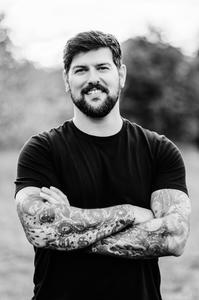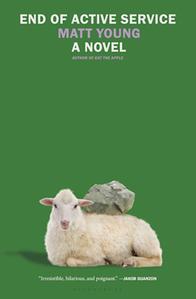
|
|
| Matt Young (photo: Katelynn Wyrick) |
|
Marine Corps veteran Matt Young's first book, Eat the Apple, was a structurally inventive memoir about his time in the service. His novel, End of Active Service (available now from Bloomsbury; reviewed in this issue), centers on a young man who's left the Marines and returned home to Indiana, where he's haunted by memories of his squad and Iraq. Young has also published stories and essays in Time, Granta, Tin House, Catapult, and the Cincinnati Review, among others. He teaches composition, literature, and creative writing at Centralia College in Washington.
When did you know you wanted to write a novel? Was it conceived before or after your memoir?
Like a lot of creative writers, I thought fiction was the thing that I wanted to write, but I was terrible at it. I stopped writing it for a while, and I thought after I wrote my memoir that I would just keep writing nonfiction.
I was trying to write about parenthood. I'm adopted myself, and I was trying to write about my adoption and stuff like that. I finally wrote this creative nonfiction essay that was about taking my daughter home from the hospital. I have a little bit of that creative nonfiction essay from then in the novel now.
Then I started writing these really short fiction pieces that accompanied it. My daughter was the centerpiece, and I was kind of a vague character, but it wasn't really me. I wrote one fictional piece about cutting my daughter's face out of pictures and pasting them onto pictures of me when I was in the Marine Corps. It sustained the voice from the nonfiction, but it felt weird because I didn't know what to do with it. I hadn't really pictured myself writing a novel. But then I didn't really question it for too long because I liked what I was doing. It ended up snowballing into all these little tiny vignette pieces. And, eventually, I formed it into a more traditionally structured novel. But I didn't have a plan to write a novel, I wanted to write nonfiction, and then that just blew up.
 The novel has two different storylines: Dean after getting out of the Marine Corps and Dean's time in the service. I'm just curious how you approach time. What was your relationship with it when you were writing the novel?
The novel has two different storylines: Dean after getting out of the Marine Corps and Dean's time in the service. I'm just curious how you approach time. What was your relationship with it when you were writing the novel?
I was finishing my MFA and this was my thesis project. I was reading about fractured narratives and structures of time in literature. On the whole, it was looking at chronological time, segmented time, and circular time. I was thinking about how oftentimes in memoir, or a narrative, where the protagonist has undergone some kind of trauma, then often the narrative structure of time is presented in this fragmented way, because that's how our brains kind of process.
Dean's split between these two spaces, but also, in his day-to-day life, not everything holds consequence for him. There are moments that stick out, that are more significant and that are related, in some way, or paralleling things that have happened in the past. I was thinking about the idea that time is a flat circle, that everything is always happening, and that it's always going to be happening and repeating itself. Dean's experiencing that kind of time.
Dean presents as all tooth and nail and tough, but there are glimpses of tenderness. What comes to mind is when he says the first time he touched a gun was in the Marines. Growing up, he hadn't wanted to go hunting with a friend because he hadn't wanted to shoot a deer. Did the balance of tender moments and violence come organically?
I think it's pretty organic, because the character is essentially a black mirror of me in some way. I grew up in Indiana, I didn't want to go hunting with my friends. When I was a teen, I probably said, "Oh, that's so stupid. Why would you want to wake up at like four o'clock in the morning to sit in the woods for four hours or whatever?" But there's a part of me that thought, I don't want to do that. I don't want to kill an animal.
I think that balance comes from a lot of time in therapy and being able to get in touch with my vulnerability as a man again, and to think, Oh, yeah, I do have empathy. I do have this gentle side. That is also a part of being a man. It's something that Dean really struggles with, but he wants it. At least he recognizes that. Or that's how he feels he should be in the world. There are a lot of shoulds for Dean.
You showcase masculinity in many forms, including the toxic variety. I'm thinking about Rick versus Dean versus Court versus Ruiz. Was that deliberate or did it just come from the story?
They're all various men that I've encountered. There's not really an intent to kind of showcase all these potentially terrible men or something like that. But I think, in my experience, at least, those are kind of like the stereotypical stock characters that you seem to encounter in some way.
They're also varying models that Dean sees for himself. He doesn't really know who he is. He's essentially a blank slate. And he's trying to figure out what parts to add, and what parts to jettison and, I don't necessarily know that these other men in his life know who they are, either.
But Dean seems to think that they do. It was more about putting him in conversation with somebody who's going to maybe fulfill our expectations in some way, but also surprise us in some way.
One of the tricky things about writing about the military is how to translate jargon and acronyms for a broader audience. It seems pretty seamless in the story. But was that a struggle? How did you approach it?
In my first book, I didn't take that into account at all. I think some people are like, "I didn't really understand this part." I don't know if you really need to--that jargon is meant to evoke a feeling. But, yeah, there were parts that I rewrote. And I think there are some moments of avoidance. There are a couple of times where Dean says something out loud, or thinks a thought, or is narrating to the audience or something in a way that I wouldn't if I was telling the story. I wouldn't say that acronym out loud. I wouldn't spell it out for somebody at first, I'd wait for them to ask, or something like that. So it was like paying attention to those kinds of things because I didn't want people to get lost in it.
I do think that there's another space of confusion for people because that is just the way that he talks about his time in the Marines and the infantry. The experience is so steeped in jargon. I think part of it can be a mechanism to kind of throw people in the deep end and have them feel immersed in that space. But it's probably a balance. My editor was really helpful in that and having me dial it back this time around.
Did you look to any books or authors as guideposts while drafting the novel?
I have three novels that I was reading as I was thinking about the time structures I mentioned. Christopher Isherwood's A Single Man; Ceremony by Leslie Marmon Silko; and this really quiet book by Tove Jansson called The Summer Book. --Nina Semczuk

